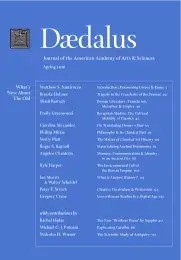Philosophy & Its Classical Past
The notion that philosophers can abandon their history and set their arguments on new foundations has a long history. One strain of recent philosophy that traces its roots to Frege has been particularly confident in this regard, and its rejection of a classical past has had widespread influences on the study of ancient philosophy over the past several decades. With the waning of this recent paradigm, however, the possibility of philosophical engagement between the old and new has again led to significant work in several areas of philosophy. I concentrate on one of these, the philosophy of death, and also ask whether ancient philosophy might furnish models that enable contemporary philosophers to rise above their specialisms and address crucial issues in a public discourse, allowing for both mutual intelligibility and criticism.
If you want a future, darling, why don't you get a past?
–Cole Porter
Back in the 1970s, there was a story in circulation about a newly minted ancient philosopher being introduced to an American philosopher of note, who asked what area of philosophy the younger man was interested in. When he replied “ancient philosophy,” the response he reputedly received was “Ancient philosophy. Really? You mean like Frege?”
I have heard so many versions of this story with so many different names attached to its protagonists that it is hard not to be skeptical about its veracity. Yet, like the opening confrontations of many a Platonic dialogue, this bit of probable fiction neatly encapsulates a set of deeper questions. I remember that I had readied my own cheeky retort to such barbs, just in case: “Oh God no, nothing so vulnerable to a few simple paradoxes as the Grundgesetze. I am interested in difficult and complex PHIL-O-SO-PHERS like Aristotle and Chrysippus,” throwing in the latter, instead of the more obvious Plato, because it was unlikely that any nonspecialist would know much about ancient Stoicism; and that would afford me the opportunity to toss around a few choice tidbits about the origins of propositional logic. But, of course, both the disingenuous put-down and my own overly defensive imaginary retort spoke to an anxiety then present in our field, as well as to a series of more long-standing questions about the relation of philosophy to its past. . . .
